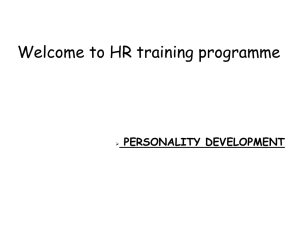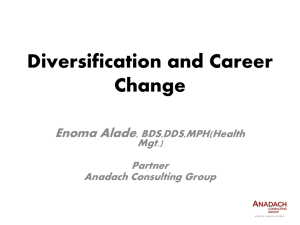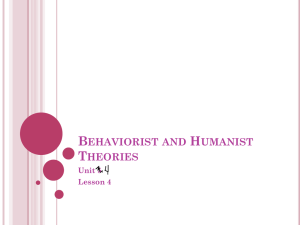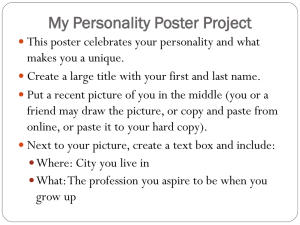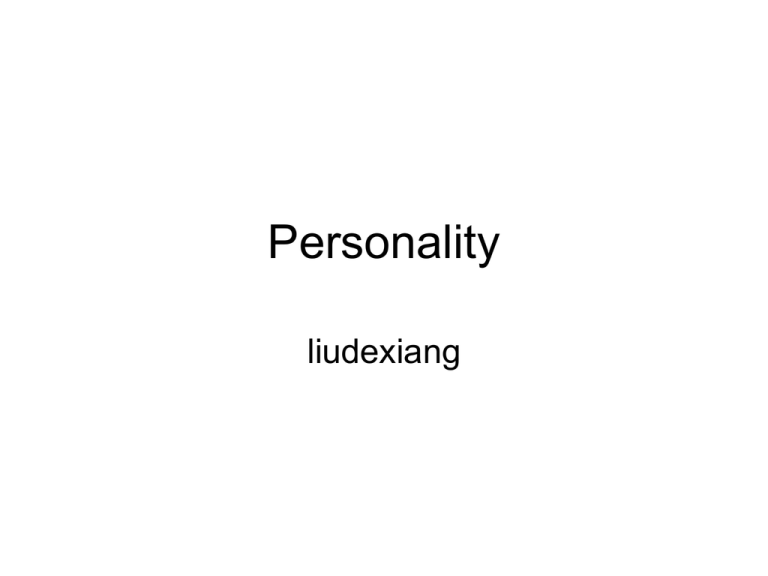
Personality
liudexiang
Overview
•
•
•
•
Personality
Psychodynamic theories
Humanistic personality theories
Personality assessment
Personality
• An individual’s unique pattern of thoughts,
feelings, and behaviors that persists over
time and across situations.
Psychodynamic theories
• Personality theories contending that
behavior results from psychological forces
that interact within the individual, often
outside conscious awareness.
Unconscious theory
• Conscious
• Freud’s first level of awareness, consisting of the
thoughts, feelings, and actions of which people are
aware.
• Preconscious
• Freud’s second level of awareness, consisting of the
mental activities of which people gain awareness by
attending to them.
• Unconscious
• Freud’s third level of awareness, consisting of the mental
activities beyond people’s normal awareness.
Personality structure
• Id: In Freud’s theory of personality, the
collection of unconscious urges and
desires that continually seek expression.
• Pleasure principle : According to Freud,
the way in which the id seeks immediate
gratification of an instinct.
Personality structure
• Ego : Freud’s term for the part of the
personality that mediates between
environmental demands, conscious, and
instinctual need; now often used as a
synonym for self.
• Reality principle : According to Freud, the
way in which the ego seeks to satisfy
instinctual demands safely and effectively
in the real world.
Personality structure
• Super ego : According to Freud, the social
and parental standards the individual has
internalized; the conscious and the ego
ideal.
• Ego ideal: The part of the superego that
consists of standards of what one would
like to be.
Personality structure
How personality develops
• Libido : According to Freud, the energy
generated by sexual instinct.
• Fixation : According to Freud, a partial or
complete halt at some point in the
individual’s psychosexual development.
How personality develops
• Oral stage : First stage in Freud’s theory of
personality development, in which the
infant’s erotic feelings center on the mouth,
lips, and tongue.
• Anal stage : Second stage in Freud’s
theory of personality development, in
which a child’s erotic feelings center on
the anus and on elimination.
How personality develops
• Phallic stage : Third stage in Freud’s
theory of personality development, in
which erotic feelings center on the genitals.
• Oedipus complex and Electra complex:
According to Freud, a child’s sexual
attachment to the parent of the opposite
sex and jealousy toward the parent of the
same sex; generally occurs in the phallic
stage.
How personality develops
• Latency period : In Freud’s theory of
personality, a period in which the child
appears to have no interest in the other
sex.
• Genital stage : In Freud’s theory of
personality development, the final stage of
normal adult sexual development, which is
usually marked by mature sexuality.
Carl Jung
• Personal unconscious : In Jung’s theory of
personality, one of the two levels of the
unconscious; it contains the individual’s
repressed thoughts, forgotten experiences,
and undeveloped ideas.
• Collective unconscious : The level of the
unconscious that is inherited and common
to all members of a species.
Carl Jung
• Archetype : In Jung’s theory of personality,
thought forms common to all human
beings, stored in the collective
unconscious.
• Persona : According to Jung, our public
self, the mask we wear to represent
ourselves to others.
Carl Jung
• Extrovert : According to Jung, a person
who usually focuses on social life and the
external world instead of on his or her
internal experience.
• Introvert : A person who usually focuses
on his or her own thoughts and feelings.
Alfred Adler
• Compensation : According to Adler, the
person’s effort to overcome imagined or
real personal weaknesses.
• Inferiority : In Adler’s theory, the fixation on
feelings of personal inferiority that results
in emotional and social paralysis.
Humanistic personality theories
• Any personality theory that asserts the
fundamental goodness of people and their
striving toward higher levels of functioning.
Humanistic personality theories
• Actualizing tendency: According to Rogers,
the drive of every organism to fulfill its
biological potential and become what it is
inherently capable of becoming.
Humanistic personality theories
• Self-actualizing tendency: According to
Rogers, the drive of human beings to fulfill
their self-concepts, or the images they
have of themsevles.
Humanistic personality theories
• Unconditional positive regard: In Roger’s
theory, the full acceptance and love of
another person regardless of his or her
behavior.
• Conditional positive regard: In Roger’s
theory, acceptance and love that are
dependent on another’s behaving in
certain ways and on fulfilling certain
conditions.
Personality assessment
•
•
•
•
The personal interview
Direct observation
Objective tests
Projective tests
Objective tests
• Personality tests that are administered
and scored in a standard way.
• Sixteen personality factor questionaire
(16PF) : Objective personality test created
by Cattell that provides scores on the 16
traits he identified.
Objective tests
• Minnesota Multiphasic Personality
Inventory (MMPI) : The most widely used
objective personality test, originally
intended for psychiatric diagnosis.
Minnesota Multiphasic Personality
Inventory (MMPI)
• The test itself consists of a series of 567
items to which a person responds “true,”
“false,” or “cannot say.” The questions
cover a variety of issues, ranging from
mood to opinions to physical and
psychological health.
Minnesota Multiphasic Personality
Inventory (MMPI)
1. I feel useless at times.
2. People should try to understand their
dreams.
3. I am bothered by an upset stomach
several times a week.
4. I have strange and peculiar thoughts.
Minnesota Multiphasic Personality
Inventory (MMPI)
5. I get along well with others.
6. Sometimes I hear voices telling me to do
bad things.
7. At times I am full of energy.
8. I am afraid of losing my mind.
9. Everyone hates me .
Projective tests
• Personality tests : Personality tests, such
as the Rorschach inkblot test, consisting of
ambiguous or unstructured material.
Rorschach Test
• A projective test composed of ambiguous
inkblots; the way people interpret the blots
is thought to reveal aspects of their
personlity.
Thematic Apperception Test
• A projective test composed of ambiguous
pictures about which a person is asked to
write a complete story.
The end






